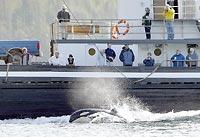![]()
| Traffic | Weather | Your account | Movies | Restaurants | Today's events |
|
|
Monday, May 9, 2005 - Page updated at 12:00 a.m. Guest columnist Luna deserves our protection and our understanding Special to The Times
The dramatic events of last summer's attempt to reunite Luna, the solitary killer whale, with his pod left many with unanswered questions and/or misconceptions. Many of us involved feel an obligation to recap the past, and to assert our beliefs concerning the future. Luna's story is complex and how it gets resolved has direct impact on the Puget Sound orca. The Pacific Northwest resident orca are the most well-understood wild marine mammals in the world. We know they live their entire lives within the pod to which they are born. In their culture, they hunt, play, sleep, socialize and always exist within intimate proximity to their family. Unfortunately, we also know that Luna's species is the most toxically polluted on Earth. Being at the top of a polluted food chain, orca carry PCBs in excess of 149 parts per million — 20 times the quantity known to cause serious diseases in humans. As an example of this toxic burden, a 22-year-old adult male (J18) died four years ago, never having reached sexual maturity, never having sired another generation. And the situation for Luna is just as precarious. In the waters of Nootka Sound where Luna has spent four of his five years, there are plans for seven fish farms, and three are already in place. The techniques employed by fish farms result in underwater devastation lasting far beyond the life of the farm itself, and operating such facilities within the known habitat of an endangered species demands immediate and thorough research. What makes this so very tragic is that orca are one of the most biologically advanced species in the animal kingdom. They have one of the greatest brain-to-body weight ratios that has ever existed. They have huge structures in their brains related to acoustic processing that have no parallel in human physiology. There is growing awareness that underwater noise is unchecked — with direct effects on orca. Even Luna's home, although remote, suffers from this and offers a perfect opportunity for research. The attempts to reunite Luna with his pod last year were not successful. The natural reunion supported by so many failed because his family chose the less-frequent path along the east coast of Vancouver Island. The physical, "hard" capture attempt failed because the cultural beliefs of the Mowachaht/Muchalaht people were completely ignored, and they felt the need to intercede on Luna's behalf. This is a point that is so often misunderstood, it is worth revisiting: Many believe that the Mowachaht/Muchalaht wanted to "keep Luna for themselves." Nothing could be further from the truth. In fact, Chief Mike Maquinna supported our search for Luna's family. It was he who granted us permission to sail our vessel (the ANON) into Friendly Cove, allowing us to conduct an exhaustive search, around the clock for over two months straight, looking for L-Pod. But Mowachaht/Muchalaht did, from the beginning, oppose the hard capture because: It was potentially dangerous to Luna — as demonstrated by the many orca that died during the aquarium capture operations of the 1970s; there were insufficient contingencies to guarantee Luna's ultimate freedom — and especially so in the face of Luna's monetary value to the captive industry; and the forced removal of Luna from Nootka Sound was seen as disrespectful — to both Luna and to the cultural significance he holds for them. And so we stand today, fully 10 months later. Due to the tensions of last summer's hard-capture failure, it is unlikely that there will be another attempt. There is no funding to facilitate a natural reunion, and so unless Luna and his pod happen to reunite all on their own, Luna is probably going to remain in Nootka Sound. So what are we going to do about it? We believe there are two goals: keep Luna safe from curious boaters, and study him for as long as he lives in Nootka Sound. The need for stewardship should be clear. Last summer, many people were drawn to Nootka Sound to get a look at Luna. The temptation to get closer is more than some can resist, and ignoring the consequences, they get more Luna than they want. But more importantly, nongovernmental organizations and Mowachaht/Muchalaht Fisheries have been studying Luna's vessel interactions all winter. And what they've found is worth further research: Luna only interacts with less than 1/10th of 1 percent of the boats in Nootka Sound, but nearly all of those are using fish finders and/or depth sounders. It's a known fact that Luna pulls transducers off of boats, and the correlation, if proved, could have direct implications for the entire orca population.
The bottom line is simple. Luna is a member of an endangered species, and as such deserves stewardship and understanding. History has shown that we don't often get a chance to set things right with nature, and yet we have at our fingertips one such rare occasion. Now is the time to pull out all the stops — to pull together — to keep Luna safe and, perhaps more urgently, to learn as much as we can about how our actions affect his underwater home. Keith Wood is founder of www.ANON.org, a nonprofit conservation and research concern. He is captain of the S/V ANON, the principal vessel engaged in last year's search for Luna's family. Contact him at info@anon.org Copyright © 2005 The Seattle Times Company
|
|
||||||||||||

